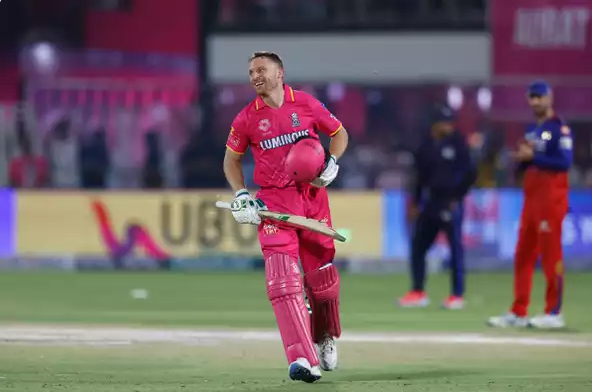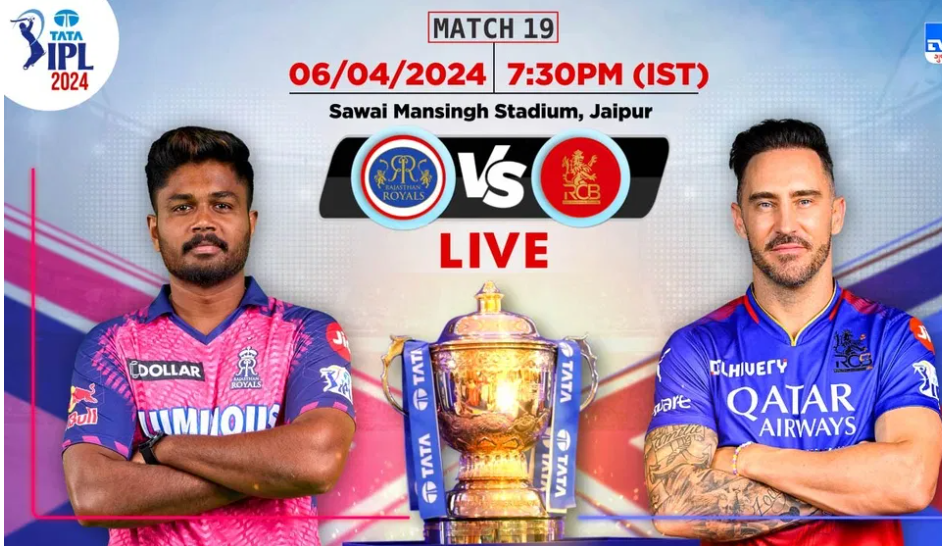
Royal Challengers Bengaluru scored 183/3 in 20 overs, where as Rajasthan Royals scored 189/6 in 19.1 overs.
So, finally Rajasthan Royals beat Royal Challengers Bengaluru by 6 wickets.
Virat Kohli’s eighth IPL century ended in disappointment as Rajasthan Royals clinched a comfortable six-wicket victory, extending their winning streak to four out of four matches at the start of IPL 2024.
Despite Kohli’s valiant effort, his century went in vain, marking the third occasion his IPL century was overshadowed by a defeat.
Jos Buttler’s unbeaten sixth IPL century, achieved off the last ball of the chase, and Sanju Samson’s breezy half-century guided Royals to victory with five balls to spare at the Sawai Mansingh Stadium in Jaipur on Saturday.
How would you rate Kohli’s innings?
While Kohli’s innings showcased glimpses of his prowess, it wasn’t one of his most fluent centuries in the IPL.
His timing seemed off at times, likely due to the slightly tacky nature of the pitch during the first half of the match.
Despite displaying intent to attack, not every shot proved as effective as he desired.
It took him 67 balls to reach the century mark, marking one of the slowest centuries in IPL history.
Nevertheless, Kohli started smoothly, dictating terms during the powerplay.
His acceleration picked up momentum in the second over, where he dispatched Nandre Burger for boundaries over mid-on and through square leg.
The region between deep square leg and deep mid-wicket became his primary scoring area, yielding nearly three-fourths of his runs.
He even managed to hit Burger for a six in the pacer’s subsequent over, providing RCB with a strong start.
However, despite maintaining a steady scoring rate, Kohli later admitted that the pitch wasn’t as favorable as initially perceived, prompting a downward adjustment in RCB’s target from 190 to 180, with one of the openers batting till the end.
Royals employed clever tactics, consistently varying their pace and lengths, which proved effective against RCB’s batters.
Although Kohli managed to find boundaries sporadically, particularly excelling against Avesh Khan in the death overs, his innings lacked similar success against Burger towards the end.
Additionally, his cautious approach nearing the century mark restricted RCB to 183 for 3, despite Kohli registering his joint-highest T20 score.
What was happening at the other end?
Faf du Plessis initiated the innings with a commanding boundary over covers in the first over, setting the tone for RCB’s opening partnership.
This partnership not only marked the first time RCB played out the powerplay without losing a wicket this season but also thwarted Royals’ attack, which had previously claimed nine wickets in this phase across their first three games.
Partnering with Kohli, du Plessis contributed significantly to the opening stand, adding 125 runs – the franchise’s 47th century partnership and the second-highest against Royals.
While Kohli mostly rotated strike, du Plessis ensured their partnership flourished, maintaining a rate of nearly nine runs per over, providing a solid foundation for RCB’s middle-order batters to capitalize on later.
Despite several fielding errors from Royals, including misfields and a dropped catch by Trent Boult, du Plessis eventually fell after a brisk 33-ball 44, mistiming a shot to Jos Buttler at long-on.
However, Royals quickly capitalized on this breakthrough, making it challenging for the incoming batters to settle.
Could RCB put up a fight with the ball?
Initially, signs suggested RCB could pose a challenge to RR on a pitch that Kohli claimed wasn’t as favorable as it appeared.
Reece Topley dismissed Yashasvi Jaiswal early with a top-edged pull shot, but RCB missed opportunities to further dent RR’s momentum, letting chances to dismiss Buttler slip away.
What unfolded thereafter?
Buttler and Samson took charge of the run chase.
While signs of a counterattack emerged in the fifth over, it was in the last over of the powerplay that Buttler and Samson unleashed a relentless assault, with Buttler smashing Mayank Dagar for boundaries and a six.
Despite fielding lapses from RCB, the partnership flourished, with Samson reaching his half-century in Dagar’s second over, accelerating the run rate.
As the partnership blossomed, RCB struggled for breakthroughs, as Buttler and Samson efficiently manipulated the field, largely targeting straight boundaries.
Their 148-run partnership in 86 balls almost sealed the match’s outcome, with Samson’s dismissal in the 15th over being the only significant breakthrough for RCB.
Was there a late twist?
Despite some late dismissals, RR comfortably secured the win.
Buttler’s six off the last ball of the match not only brought up his sixth IPL century but also sealed RR’s victory, leaving RCB with too much to challenge in the final over.

Leave a Reply